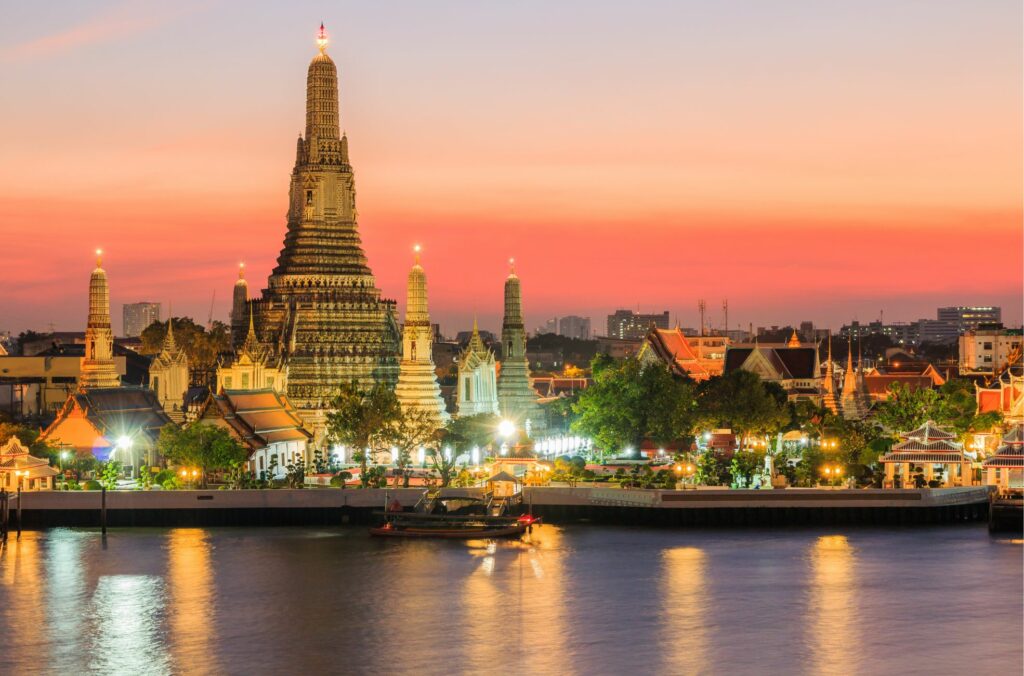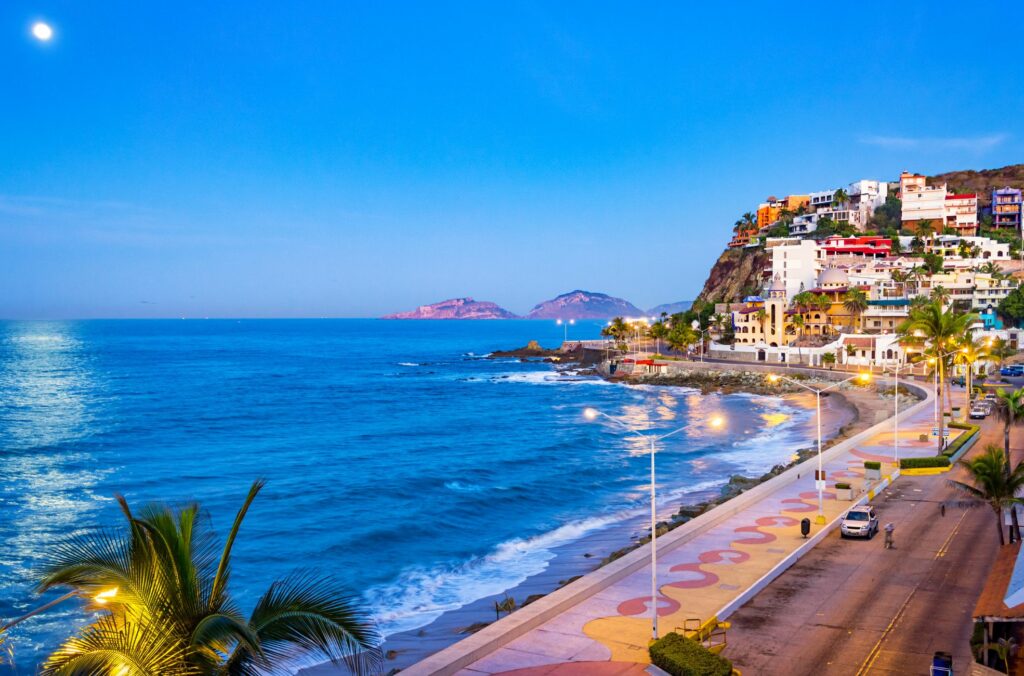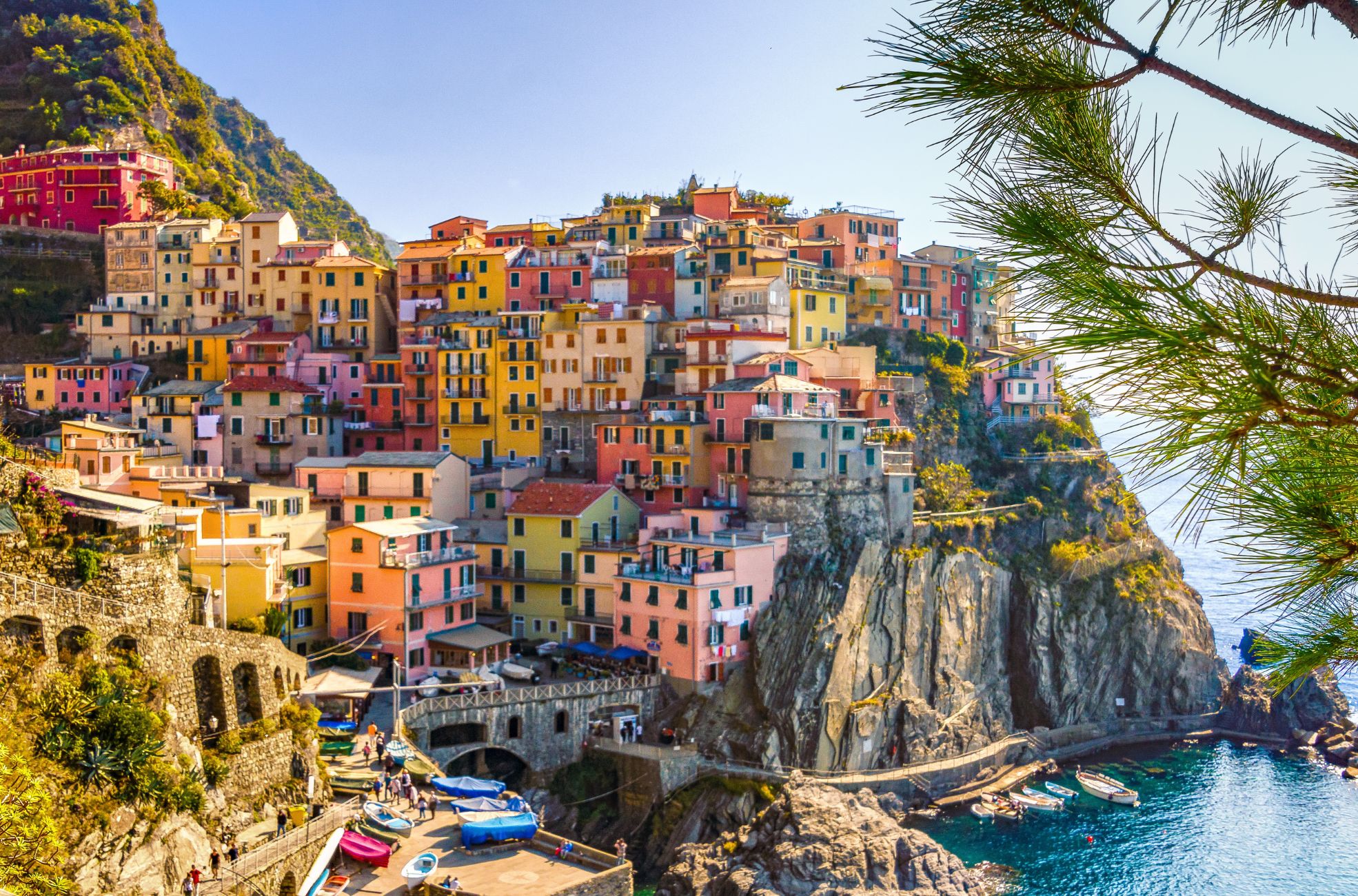Exploring the myriad of countries with retirement visas offers possibilities for those seeking a serene and fulfilling post-career life abroad. These specialized visas provide:
- The opportunity to settle in a new nation while enjoying a lower cost of living.
- Access to excellent healthcare.
- The exciting prospect of immersing oneself in a different culture.
We delve into the advantages, general eligibility criteria, and specific offerings from various global destinations.
Whether you’re enticed by the charm of European landscapes, the warmth of Asian hospitality, the vibrant cultures of Central and South America, or any other region with welcoming policies for retirees, we have compiled a comprehensive overview to help you navigate the path to your ideal retirement haven.

What is a retirement visa?
A retirement visa is a type of residence permit that’s tailor-made for folks looking to spend their golden years in a foreign country other than their homeland. This visa lets retirees live in a foreign nation, usually with certain financial and age requirements, to ensure they’re self-sufficient without needing to work.
General Eligibility Criteria
You’ll typically need to meet certain age requirements to qualify for a retirement visa. These can vary by country but often start at the retirement age of 55 years and can go up to 65 years in some cases. Financial stability is a crucial criterion, with countries requiring proof of a steady income or enough savings to cover living expenses. This income threshold differs from country to country. Additionally, some countries may only offer retirement visas to citizens of nations with which they have specific retirement agreements.
Benefits of Choosing a Retirement Visa
Choosing to get a retirement visa elsewhere can offer a host of advantages. Many retirees are drawn to countries with a lower cost of living, which can help their savings go further. Access to affordable healthcare is another big plus, as well as the chance to dive into a new culture and lifestyle. It can be a rewarding experience, offering a change of scenery and a more relaxed pace of life during your retirement years.
Key Considerations Before Applying
Before you apply for a retirement visa, it’s important to get to grips with the specific requirements of your intended destination country. These can include financial thresholds that need to be met, mandatory health insurance coverage, and restrictions on employment. You should be ready to collect various documents, such as a valid passport, proof of financial means, health insurance, and evidence of accommodation. The application process may also involve an interview and the submission of biometrics.
The cost of applying for a retirement visa can be significant, with fees potentially reaching up to $2,000, not including additional service and administrative expenses. These fees will vary depending on the country you choose. The validity of most retirement visas can also vary, with periods ranging from one to five years, and some countries offer the possibility of renewal or even indefinite stays. In some cases, obtaining permanent residency might be an option after living in the country for a set number of years, often at least five.
It’s worth noting that reasons for rejecting a retirement visa application can include not meeting age or financial requirements or not being from an eligible country. Therefore, doing your homework and preparing thoroughly are key to boosting your chances of a successful application.
Countries worldwide offer qualified retirement programs and visas, including Portugal, Mexico, Costa Rica, Malaysia, Dubai, Indonesia, Italy, Thailand, the Philippines, Spain, and others across various continents. Each country has its unique program with specific requirements and benefits. For example, Portugal has a retirement program that includes a visa for those who can live without working based on their financial means and a Golden Visa for individuals willing to make a significant investment in the country.
In Thailand, retirees can choose between a one-year and a ten-year retirement visa, with the latter being available to nationals from certain eligible countries. Dubai’s retirement visa requires that applicants be over 55 and meet investment or retirement income amount criteria. Indonesia’s retirement visa is available only to citizens of selected countries. It must be applied for through an approved travel agency.
Italy offers the Elective Residence Visa to foreigners who can show they have enough funds to retire comfortably in Italy without the need for employment. The visa application process can take several months, and the time frame varies depending on the country and the volume of applications they receive. It’s wise for potential applicants to start the process well ahead of their intended move date to account for any delays or additional requirements that may come up.

European Destinations with Retirement Visas
Portugal’s D7 Visa
Introduced in 2007, Portugal’s D7 Visa, often called the Retirement or Passive Income Visa, is open to non-EU/EEA/Swiss citizens. It’s designed for individuals who have a reliable passive income, such as pensions, rental earnings, or investment returns. Applicants must demonstrate a minimum income of $830 per month.
This visa grants a two-year temporary residence, renewable for three years. After five years, you may qualify for permanent residency and potentially citizenship, provided you fulfill the necessary requirements. Holders of the D7 Visa can enjoy visa-free travel within the Schengen Zone and access to Portugal’s healthcare and educational services.
Family reunification processes are straightforward, allowing your family members to join you seamlessly. Applicants must have health insurance, a clean criminal record, and a registered address in Portugal. The initial residence permit mandates a stay of at least 16 months within the first two years. The application fee is approximately $100, and the residence permit fee is about $175.
Holders of the D7 Visa become tax residents in Portugal and may benefit from the Non-Habitual Resident (NHR) regime, which provides tax incentives on certain types of income for a decade. Although the NHR regime is anticipated to conclude, those who registered or or were eligible by the end of 2023 can still reap its benefits for the allotted time.
Spain’s Non-Lucrative Visa
Spain’s Non-Lucrative Visa is intended for individuals who wish to reside in Spain without engaging in professional activities. Applicants must prove sufficient funds to sustain themselves for the initial year. The financial requirement is a minimum of 400% of the IPREM.
When applying, you must provide:
- Proof of regular income.
- A clean criminal record for the past five years.
- A medical certificate that confirms you don’t carry any diseases that could pose a public health risk.
Once in Spain, you have 90 days to apply for a Foreigner Identity Card. This visa does not permit employment in Spain.
Greece’s Financially Independent Persons Visa
Greece’s Financially Independent Persons (FIP) Visa is available to non-EU nationals who can prove they have a sufficient yearly income to support themselves without employment. The visa provides a two-year residence permit, and applicants must demonstrate a minimum income of $2,190 per month, with an additional amount for dependents.
You must secure a special visa from a Greek embassy or consulate to initiate the process. Required documents include:
- A valid passport.
- A criminal record certificate.
- A medical certificate.
- Proof of comprehensive medical insurance.
The FIP Visa also prohibits employment in Greece.
Italy’s Elective Residency Visa
Italy’s Elective Residency Visa caters to individuals with a substantial self-sustaining income who desire to settle in Italy. Applicants must show a minimum annual income of $34,000 for individuals or $41,660 for couples, derived from sources other than employment. Additionally, you must have a registered lease or property deed in Italy and a letter stating your intention to reside there.
This visa offers a way to immerse yourself in Italy’s culture, cuisine, and history, funded entirely by your own resources.

Asian Countries Offering Retirement Visas
Thailand’s Retirement Visa Requirements
Thailand offers a retirement visa, known as the “Extension of Stay Based on Retirement,” which is an extension of a Non-Immigrant O Visa or Non-Immigrant OA Visa. This visa allows for a 1-year stay, renewable annually.
Applicants must be at least 50 years old. Financial requirements can be met by depositing $23,000 (THB 800,000) in a Thai bank, providing a monthly income of $1,865 (THB 65,000), or a combination of both that equals the deposit amount.
For the deposit, evidence such as an updated bank book and a letter from the bank confirming the funds’ overseas source for at least two months is required. A letter from your embassy or a 12-month bank statement showing consistent deposits is needed for the monthly income. The process begins with a 90-day initial non-immigrant visa, followed by the retirement visa application after a 60-day period or within the last 30 days of your current permit to stay.
Proof of accommodation is necessary, and retirees must report their address to the Immigration Office every 90 days. A re-entry permit is required for those wishing to leave and re-enter Thailand without affecting the visa’s validity. Employment is not permitted for visa holders.
Malaysia’s My Second Home Program
Malaysia’s My Second Home (MM2H) program has seen financial and residency requirements increase. Yet, it continues to be a favored option for retirees. The government has signaled potential future adjustments to make the MM2H program more appealing.
Conversely, Sarawak offers a less costly alternative due to its control over immigration policy. The Premium Visa Program (PViP), which operates alongside MM2H, has attracted fewer participants.
The Philippines’ Special Resident Retiree’s Visa
The Philippines offers the Special Resident Retiree’s Visa (SRRV), which provides multiple-entry privileges and exempts holders from various taxes and the annual report requirement. It also permits a one-time tax-free importation of household goods up to a value of $7,000.
The SRRV has different options, such as the SRRV SMILE for active retirees with a deposit of $20,000 and the SRRV CLASSIC, which allows for investment in property. There are also options for retirees with health issues (SRRV HUMAN TOUCH), former Filipinos, or retired officers from international organizations (SRRV COURTESY and SRRV EXPANDED COURTESY).
Financial requirements include a deposit of $10,000, a monthly pension of USD 800 for pensioners aged 50 and above, and a deposit of $20,000 for those without a pension. Younger applicants aged 35 to 49 are required to deposit $50,000. Necessary documentation for the application includes a valid passport, medical and police clearances, and proof of the visa deposit.
Indonesia’s Retirement Visa Overview
Indonesia’s retirement visa is available for those aged 55 and above. It is valid for one year, with the possibility of renewal for up to five years. Applicants must demonstrate a monthly income of at least $1,500 and have health insurance.
Applicants are also required to show proof of accommodation and hire an Indonesian domestic helper. The visa prohibits any form of employment. Indonesia’s retirement visa initiative is aimed at attracting retirees who can contribute to the economy while enjoying their post-career life in the country.

Central and South America Retirement Visas
Panama’s Pensionado Program
Panama’s Pensionado Program is a popular choice, offering a range of discounts and perks for retirees. To be eligible, you must be at least 65 years old and have a monthly pension of at least $800.
The income must be guaranteed for life and sufficient to sustain you in Panama. A clean criminal record is essential, and applicants must not be considered a threat to national security.
The program is designed to allow retirees to enjoy Panama’s diverse environment and lifestyle.
Costa Rica’s Pensionado Residency
Costa Rica’s Pensionado Residency requires proof of a stable monthly pension of at least $1,000.
For those who do not meet this pension requirement, Costa Rica also offers an Investor visa for individuals ready to invest a minimum of $200,000 in the country’s real estate, stocks, or businesses.
Costa Rica welcomes retirees and investors to its verdant environment and biodiverse regions.
Mexico’s Temporary Resident Visa
Mexico offers a Temporary Resident Visa for retirees, requiring proof of a consistent monthly income of $2,500 over the previous six months. This visa is valid for one year and can be a stepping stone to permanent residency.
You may be eligible for permanent residency after four years on a Temporary Resident Visa. After an additional five years, you can apply for naturalization to become a Mexican citizen.
Ecuador’s Pensioner Visa
Ecuador’s Pensioner Visa is available to those who can demonstrate a permanent income of at least $1,000 per month from a pension.
After three years of residency, you may apply for citizenship through naturalization, allowing you to fully integrate into Ecuador’s society and enjoy the same rights as Ecuadorian nationals.

Navigating the Application Process
Gathering Necessary Documentation
Embarking on the application process, you’ll need to compile a dossier of essential paperwork. This includes the application form specific to the retirement visa, alongside a current passport and recent photographs that meet passport specifications. A copy of your national ID and birth certificate will be necessary to confirm your identity.
For those to whom it pertains, documentation of marital status changes, such as marriage and divorce certificates, should be included. Demonstrating your financial capability is a must, with documents like bank statements or proof of assets.
Life and health insurance documentation is indispensable, ensuring you’re prepared for any health-related issues. Additionally, you’ll need to provide proof of your living arrangements in the destination country.
Financial Requirements and Proof of Income
Each country sets its own benchmarks for the financial resources required of retirees. For instance, applicants over 50 in Thailand must provide evidence of a certain level of funds or a regular income.
You must demonstrate the ability to sustain yourself financially in the absence of employment, which is typically prohibited on this type of visa. Application fees vary by country, so it’s crucial to be aware of these financial obligations in advance.
Healthcare and Insurance Considerations
Many countries mandate specific insurance coverage as part of the visa application. For example, certain Thai visas necessitate health insurance that meets minimum coverage standards for medical expenses. This requirement is in place to safeguard retirees from the financial burden of healthcare costs.
Applicants must present proof of health insurance that complies with the host country’s criteria. If obtaining insurance is challenging due to age or pre-existing conditions, alternative visa categories that do not necessitate health insurance for application or renewal may be available.
Renewal Policies and Permanent Residency Options
Familiarizing yourself with the renewal procedures and the potential for permanent residency is crucial for long-term planning. Some countries may offer more lenient renewal processes or the option for an indefinite stay, providing retirees with a sense of security and continuity in their new environment.
Embark on Your Next Adventure
Are you ready to trade the familiar for the exotic or seek a cost-effective oasis to enjoy your retirement? These myriad retirement visa programs globally present profound opportunities for growth, relaxation, and exploration in your later years.
From the sun-drenched coastlines of Portugal to the lush landscapes of Costa Rica, there’s a slice of paradise fit for every retiree’s preference. As you consider your options, plan diligently—navigating financial requisites, understanding healthcare necessities, and tying up the loose ends of paperwork.
Remember, the world is expansive, and your retirement should be too. Approach this next chapter with curiosity, and let the promise of new scenery, cultures, and experiences guide your decision. Safe travels, future expats, and may your retirement adventures be as rewarding as they are diverse.





